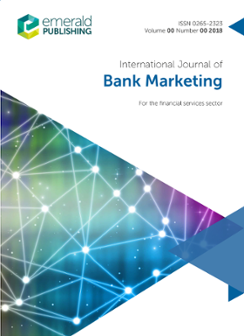The direct and indirect effects of financial socialization and psychological characteristics on young professionals' personal financial management behavior
IF 6.9
3区 管理学
Q1 BUSINESS
引用次数: 0
Abstract
PurposePrior work expresses concern about young people's rising debt and lack of financial preparedness. This study focuses on how financial socialization and psychological characteristics affect the personal financial management behavior (PFMB) of young professionals in India. The authors examine both the direct effect of these factors and the indirect effects through financial literacy and aforementioned psychological characteristics as mediators.Design/methodology/approachThe authors develop a conceptual framework based on the extant literature and empirically test its hypotheses employing partial least squares structural equation modelling (PLS-SEM).FindingsAttitude towards money, financial self-efficacy, financial risk tolerance, financial socialization through parental direct teaching and peers, and media are all positively associated with young professionals' PFMB, whereas external locus of control and procrastination are negatively associated with their PFMB. Almost all psychological characteristics partially mediate the association between financial socialization and PFMB. Finally, financial literacy plays a partially mediating role in the association between procrastination and PFMB as well as between financial socialization and PFMB.Practical implicationsThis study helps regulators and policymakers understand PFMB among young professionals. Interventions should build on the positive role of financial socialization, cultivating a good attitude towards money and financial self-efficacy, and reducing reliance on an external locus of control and procrastination. This study also helps policymakers and financial educators develop societally beneficial personal finance programs.Originality/valueThis research investigates social, psychological and cognitive characteristics in a comprehensive framework to further the authors’ understanding of the topic of PFMB.金融社会化和心理特征对青年专业人员个人理财行为的直接和间接影响
目的先前的工作表达了对年轻人不断增加的债务和缺乏财务准备的担忧。本研究的重点是金融社会化和心理特征如何影响印度年轻专业人士的个人财务管理行为。作者通过金融素养和上述作为中介的心理特征,考察了这些因素的直接影响和间接影响。设计/方法论/方法作者在现有文献的基础上开发了一个概念框架,并采用偏最小二乘结构方程模型(PLS-SEM)对其假设进行了实证检验,和媒体都与年轻专业人士的PFMB呈正相关,而外部控制源和拖延与他们的PFMB呈负相关。几乎所有的心理特征都在一定程度上介导了金融社会化与PFMB之间的联系。最后,金融素养在拖延症与PFMB以及金融社会化与PFMB之间的联系中起着部分中介作用。实践意义本研究有助于监管机构和决策者了解年轻专业人士的PFMB。干预措施应建立在财务社会化的积极作用之上,培养对金钱的良好态度和财务自我效能感,减少对外部控制源和拖延症的依赖。这项研究还帮助政策制定者和金融教育工作者制定有益于社会的个人金融计划。原创性/价值本研究在一个全面的框架内调查了社会、心理和认知特征,以进一步加深作者对PFMB主题的理解。
本文章由计算机程序翻译,如有差异,请以英文原文为准。
求助全文
约1分钟内获得全文
求助全文
来源期刊

International Journal of Bank Marketing
BUSINESS-
CiteScore
10.70
自引率
18.90%
发文量
54
期刊介绍:
International Journal of Bank Marketing (IJBM) aims to publish papers that relate to the marketing challenges of financial services providers around the globe.
Preference is given to empirically-based research papers that expand on existing theories (or develop new ones) on customer behaviour in financial services settings.
In addition, the journal is interested in helping academicians and practitioners in the field to better understand the discipline of financial services marketing, and as a result review papers and thought pieces are invited for submission.
 求助内容:
求助内容: 应助结果提醒方式:
应助结果提醒方式:


